Related Research Articles

Secondary education is the last six or seven years of statutory formal education in the United States. It culminates with twelfth grade. Whether it begins with sixth grade or seventh grade varies by state and sometimes by school district.
Education in China is primarily managed by the state-run public education system, which falls under the Ministry of Education. All citizens must attend school for a minimum of nine years, known as nine-year compulsory education, which is funded by the government.

Information and communications technology (ICT) is an extensional term for information technology (IT) that stresses the role of unified communications and the integration of telecommunications and computers, as well as necessary enterprise software, middleware, storage and audiovisual, that enable users to access, store, transmit, understand and manipulate information.
Educational technology is the combined use of computer hardware, software, and educational theory and practice to facilitate learning. When referred to with its abbreviation, "EdTech", it often refers to the industry of companies that create educational technology. In EdTech Inc.: Selling, Automating and Globalizing Higher Education in the Digital Age, Tanner Mirrlees and Shahid Alvi (2019) argue "EdTech is no exception to industry ownership and market rules" and "define the EdTech industries as all the privately owned companies currently involved in the financing, production and distribution of commercial hardware, software, cultural goods, services and platforms for the educational market with the goal of turning a profit. Many of these companies are US-based and rapidly expanding into educational markets across North America, and increasingly growing all over the world."
The Knowledge is Power Program, commonly known as KIPP, is a network of free open-enrollment college-preparatory public charter schools in low income communities throughout the United States. As of 2009, KIPP is North America's largest network of public charter schools. The head offices are in San Francisco, Chicago, New York City, and Washington, D.C.
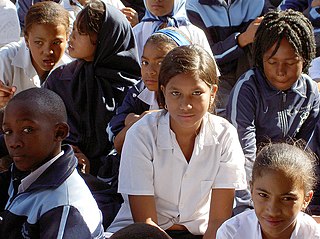
Education in South Africa is governed by two national departments, namely the Department of Basic Education (DBE), which is responsible for primary and secondary schools, and the Department of Higher Education and Training (DHET), which is responsible for tertiary education and vocational training. Prior to 2009, both departments were represented in a single Department of Education. Among sub-Saharan African countries, South Africa has one of the highest literacy rates. According to The World Factbook - Central Intelligence Agency as of 2019, 95% of the population aged from 15 and over can read and write in South Africa were respectively literate.
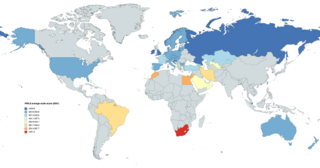
The IEA's Progress in International Reading Literacy Study (PIRLS) is an international study of reading (comprehension) achievement in 9-10 year olds. It has been conducted every five years since 2001 by the International Association for the Evaluation of Educational Achievement (IEA). It is designed to measure children's reading literacy achievement, to provide a baseline for future studies of trends in achievement, and to gather information about children's home and school experiences in learning to read.
Accelerated Reader (AR) is an educational program created by Renaissance Learning. It is designed to monitor and manage students' independent reading practice and comprehension in both English and Spanish. The program assesses students' performance through quizzes and tests based on the books they have read. As the students read and take quizzes, they are awarded points. AR monitors students' progress and establishes personalised reading goals according to their reading levels.
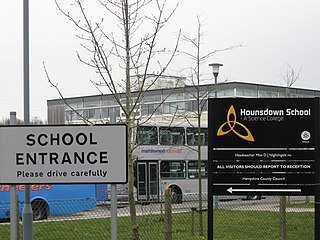
Hounsdown School is a secondary school in Totton, near Southampton, Hampshire, England The school has 1,215 pupils, spanning ages 11 to 16. Classes are held in renovated 1960s buildings and new specialist blocks built since 2000.

Education in Ghana uses a dualistic approach encompassing both formal and informal learning systems. The current formal educational system was introduced during European colonisation. However, learning systems existed prior to that. The University of Moliyili is one of the earliest learning centers in Ghana established in the 1700s. During colonisation, European settlers initially introduced a formal education system addressed to the elites, while education of the average citizen was mainly informal, and based on apprenticeship. Economic activities in pre-colonial Ghana were based on farm produce shared within households and members of each household specialized in providing necessities such as cooking utilities, shelter, clothing, and furniture, and trade with other households was therefore practiced on a very small scale. As such there was no need for employment outside the household that would have otherwise called for disciplines, values, and skills through a formal education system. After colonization, Ghana's economy became a hybrid of subsistence and formal economy.

A report card, or just report in British English – sometimes called a progress report or achievement report – communicates a student's performance academically. In most places, the report card is issued by the school to the student or the student's parents once to four times yearly. A typical report card uses a grading scale to determine the quality of a student's school work. Report cards are now frequently issued in automated form by computers and may also be mailed. Traditional school report cards contained a section for teachers to record individual comments about the student's work and behavior. Some automated card systems provide for teachers' including such comments, but others limit the report card to grades only.
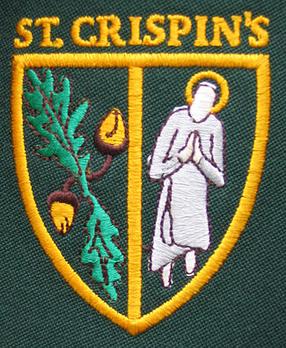
St Crispin's School, founded in 1953, is a coeducational comprehensive secondary school and sixth form located in Wokingham, Berkshire, England. There were 1,164 students at the school in 2017, of whom 234 were in the Sixth form. The school is on the London Road, just outside Wokingham town centre.
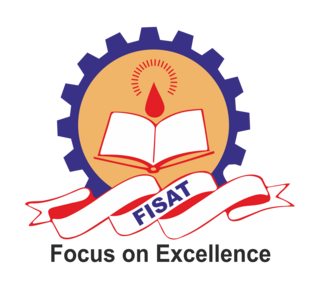
Federal Institute of Science And Technology (FISAT) is a private Engineering College and Business School in Ernakulam, Kerala, India. It is one of the top private technical institutions in the State. FISAT is accredited by NBA and NAAC and approved by AICTE and UGC. It is an initiative of the Federal Bank Officers' Association (FBOA), the organization representing the officers of the Federal Bank.
A parent–teacher conference, parent–teacher interview, parent–teacher night, parents' evening or parent teacher meeting is a short meeting or conference between the parents and teachers of students to discuss a child's progress at school and find solutions to academic or behavioral problems. Parent–teacher conferences supplement the information conveyed by report cards by focusing on students' specific strengths and weaknesses in individual subjects and generalizing the level of inter-curricular skills and competences.

Scalby School is a coeducational secondary school located in Scarborough, North Yorkshire, England. It caters for pupils aged 11–16, with around 980 on roll.
QuickSchools.com is an online school management system published by Maestro Planning Solutions, Kuala Lumpur, Malaysia, in 2002.
Irish Computer Society was founded in 1967 as the professional representing information and communication technology professionals in Ireland.
Colegio Arubano is a secondary school in Aruba that serves students in grades seven through twelve from one of its two campuses in either the capital city of Oranjestad or the southern community of Sint Nicolaas. The two campuses have been separated now, and the school in Sint Nicolaas has become a different school with the new name Colegio Nigel Matthew.
Information Communications Technology is usually included in the Home Economics and Livelihood Education program in grade school and taught through the Technology and Home Economics program in high school. The recent status of ICT education in the Philippines, along with other Southeast Asian countries, was surveyed by the Southeast Asian Ministers of Education Organization (SEAMEO) in 2011. Using the UNESCO model of ICT Development in Education, the countries were ranked as Emerging, Applying, Infusing or Transforming. The Philippines were ranked at the Infusing stage of integrating ICT in education, indicating that the country has integrated ICT into existing teaching, learning and administrative practices and policies. This includes components such as a national vision of ICT in education, national ICT plans and policies, complementary national ICT and education policies, professional development for teachers and school leaders, community or partnership and teaching and learning pedagogies. A 2012 study reported that public high schools in Metro Manila had a computer to student ratio of 1:63. While 88 percent of schools have internet connections, half of the students claimed not to be using it.

In 2020, school systems in the United States began to close down in March because of the spread of COVID-19. This was a historic event in the history of the United States schooling system because it forced schools to shut-down. At the very peak of school closures, COVID-19 affected 55.1 million students in 124,000 public and private U.S. schools. The effects of widespread school shut-downs were felt nationwide, and aggravated several social inequalities in gender, technology, educational achievement, and mental health.